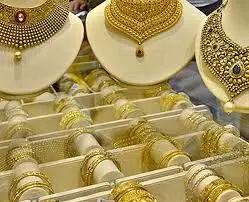Indian Gold Tycoons in Dubai Face Slowdown Amid Market Shifts
Dubai’s Indian jewellery tycoons Malabar, Joyalukkas, and Kalyan face a slowdown as India’s gold import duty cuts reshape demand. Here’s what’s driving the change.
Dubai’s gold market, led by Indian giants Malabar, Joyalukkas, and Kalyan Jewellers, faces new challenges amid shifting demand.

For decades, Indian entrepreneurs have transformed Dubai into a global gold hub, building billion-dollar empires that now dominate the UAE’s jewellery market. Brands like Malabar Gold & Diamonds, Joyalukkas, and Kalyan Jewellers are not just retail names but institutions shaping the region’s luxury landscape.
The Rise of Indian Gold Empires
From Dubai’s traditional souks to its glitzy malls, the influence of these Indian-origin jewellery giants is unmistakable. Their founders leveraged the Gulf’s long-standing love for gold and the massive South Asian diaspora to build vertically integrated businesses that span sourcing, design, and retail.
Together, these jewellery moguls are valued at $9.5 billion, according to the Bloomberg Billionaires Index — global recognition for decades of strategic expansion and deep cultural understanding.
A Shifting Market
Dubai remains a popular shopping destination, especially for the 7.2 million Indian visitors who traveled to the UAE in 2023. But recent reductions in India’s gold import duties have narrowed the price difference between Dubai and India. This has led to a 16% drop in gold jewellery demand (by weight) in the UAE in Q2 2025, as per World Gold Council data reported by The Economic Times.
Despite the slowdown, companies are holding firm. “Most of our customers are Indian, followed by other South Asians and some native Arabs,” said Ramesh Kalyanaraman, Executive Director at Kalyan Jewellers. The brand, which entered the Gulf in 2013, still reported $369 million in Middle East revenue, a 22% year-on-year rise.
Stories of Vision and Expansion
Joyalukkas: Founder Joy Alukkas, who arrived in Dubai in 1986, recalled, “I saw possibilities where others saw limits.” His brand now runs 50 outlets in the Middle East, with 28 in the UAE alone.
Malabar Gold & Diamonds: Started by M.P. Ahammed, the group pivoted from spice trading to jewellery in 2008. Today, it has 67 UAE stores and recently launched Mojawhraty, a brand designed for Arab consumers.
Kalyan Jewellers: Continuing to expand in the Gulf, Kalyan has found resilience despite market shifts, thanks to strong ties with Indian and South Asian buyers.
What Lies Ahead?
The UAE gold sector is seeing rising competition, with Titan Co. (Tata Group) acquiring a stake in Damas International. According to Andrew Naylor of the World Gold Council, the future will depend on design innovation and diversity, as brands adapt to the UAE’s multicultural consumer base.
Dubai may be facing headwinds, but for these Indian-origin jewellery giants, the city remains a glittering stage — one where resilience, heritage, and innovation will decide who stays on top.

